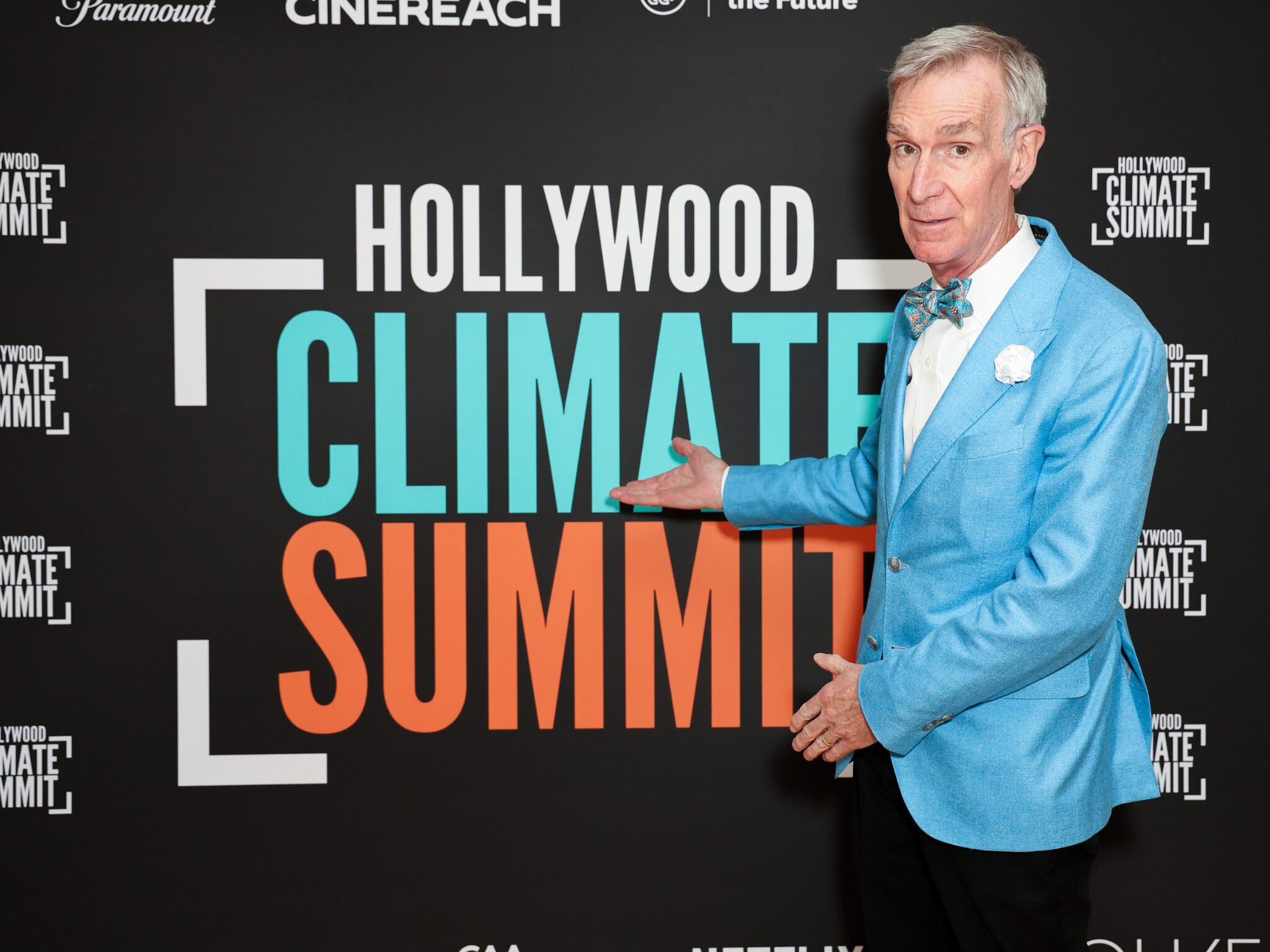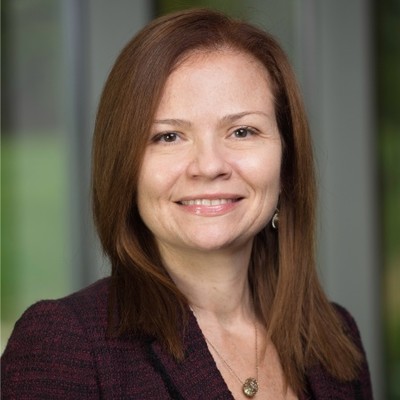Hollywood Could Be The World’s Most Powerful Weapon in the Climate Fight
9 Mins Read
This was my second year attending the Hollywood Climate Summit and for the 2024 edition, the organizers took things to another level. The event was packed with insights, inspiration, and information. Founders Heather Fipps, Allison Begalman, and Ali Weinstein’s goal for the summit is to create a community space for entertainment and media professionals to take action on climate, and from where I was sitting, mission accomplished!
With a completely revamped schedule that made it easier for industry professionals to attend (panels started in the late afternoon and went until the night versus early morning starts last year), the 2024 Hollywood Climate Summit spanned four days and featured a Climate Film & Television Marketplace for the first time – a screening of 2024’s best independent environmental and climate-themed projects looking for distribution.
There was also a daily “Vegan Food Experience” led by Chris Tucker, Director of Food and Beverage and Yo Egg’s Executive Chef.
Panel topics ranged from “Communicating Climate in Children’s Media” to “Innovative Climate Campaigns in Music, Film & Pop Culture,” and everything in between.
Producers, directors, writers, actors, production and costume designers sat down alongside journalists, activists, and climate experts to explore how Hollywood can promote climate stories and solutions while showing the impact of the climate crisis in our everyday lives.
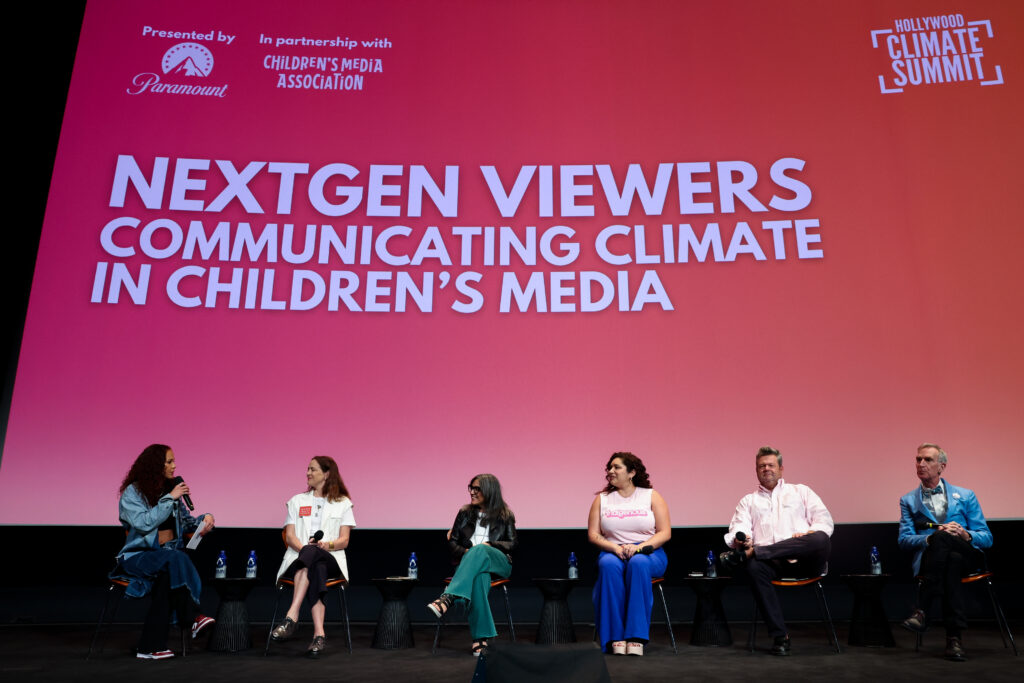
The power of storytelling in fighting climate change
Storytelling is at the heart of the entertainment industry. It’s its secret sauce, its magic pill, its superpower. Impactful storytelling is what Hollywood does when it’s at its best and it’s Hollywood’s most powerful weapon in the fight against climate change.
This doesn’t mean every television show has to be Extrapolations nor every film Don’t Look Up. We get that the entertainment industry has to be entertaining, but climate change doesn’t have to be front and centre in every story, it just has to be part of the narrative. Hacks and Murder at the End of the World are two shows that exemplified that and delivered a climate message by weaving climate change into the storytelling.
In the “On the Spotlight on TV Climate Stories” panel, co-creator of Hacks Jen Statsky, said making the twenty-something Eva character someone who deeply cares about the climate crisis felt natural and organic.
Brit Marling and Zal Batmanglij chose to bake climate crisis into their miniseries A Murder at the End of the World and experienced climate-related extreme weather issues first-hand during production in Iceland and Utah. “We really appropriately just got smacked on the face by the climate crisis which was good because we were writing about it. But it’s one thing to write about it, it’s another thing to just have everything grind to a halt because storms are coming from directions they’ve never come from before, they’re parking and just like dumping snow in volumes that no one [in Iceland] had ever seen before,” Marling told the audience.
“On the flip side of the shoot, we were in Utah and there were flash floods and there were record heights in temperature, and the entire crew at one point was crowded under an overpass and we had to just sit there because the sun was baking the ground of the desert so much that we couldn’t get back to where the set was.”
“I just don’t think we can ever tell any stories moving forward that aren’t dealing with the climate crisis because it is the story of our time,” Batmanglij added. “I don’t think we addressed it enough because the experience of making it has opened my eyes a lot.”

Making production sets sustainable
Hollywood is often villainized (fairly) for being wasteful but having started my career in the entertainment industry, it’s an industry that is very close to my heart and I can honestly say that it has made leaps and bounds when it comes to sustainability thanks to green sustainable resources from partners like Scriptation, an Emmy Award-winning app for going paperless when reading, annotating, and marking up scripts; Earth Angel, a full-service sustainability agency dedicated to reducing the environmental impact of entertainment productions; and Green Spark Group, sustainable production consultants focused on changing the climate of entertainment, to name just a few.
But can Hollywood ever really reach net zero? Maybe. As Scott Z. Burns reminded the audience in “The Academy Presents: Sustainability in Film” panel, “What we need to do is change our culture on set, so that we’re thinking about more than just accomplishing that scene, that moment, and can we do it within the boundaries of sustainability?” The writer and producer of Contagion and Extrapolations thinks plastic bottles are the low-hanging fruit, adding “not all of our waste is created equally on a set. So much of where our waste goes is transportation and food, much like the rest of the world.”
This was one of the only times food was mentioned during the summit. Project Drawdown reminds us that the two biggest levers for individuals fighting the climate crisis are reducing food waste and reducing meat consumption.
Food production, especially livestock agriculture, is a major cause of global warming – representing 14.5% of global emissions, on par with the entire aviation industry – and it’s one area that Hollywood has yet to tackle when it comes to making production sets more sustainable.
Studies show that if we decrease our animal protein intake by 30-60% we can make significant progress in reversing climate change. Last year, LinkedIn worked with its foodservice provider and non-profit Greener By Default (GDB) to shift to a 65 per cent plant-based menu using behavioural change tactics such as nudging. It can be done so why not production sets, production offices, and studio cafeterias? I would love to see Hollywood’s food carbon footprint be part of the conversation in a much bigger way at next year’s summit.
And let’s not forget the fashion industry’s toll on the planet. It was refreshing to hear from creatives like production designer Missy Parker (Hidden Figures and the upcoming Twisters), costume designer Isis Mussenden (Shrek, American Psycho), and Writer, Producer Director Gloria Calderón Kellett (One Day at a Time, With Love) talk about how they shop at vintage stores, rent costumes, reuse sets, hire locally, avoid fast fashion, and donate production leftovers to local charities.
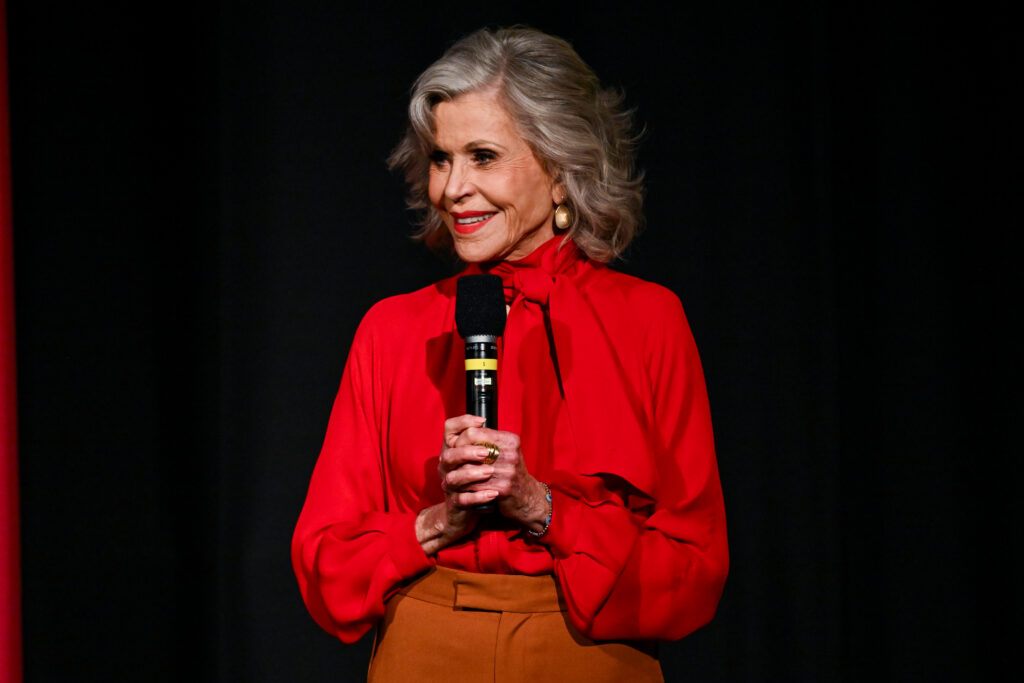
Inspirational moments
The four days were packed with inspiration and I wish I could quote every speaker in every panel because, unusually for an event of this kind, every single person’s contributions were interesting, informative, and thought-provoking. Instead, I will leave you with these last few inspirational moments I simply couldn’t omit.
Before sitting down for a fireside chat with Wonder Woman director Patty Jenkins, U.S. Secretary of Energy Jennifer M. Granholm shared “For the first time in American history, we actually expect energy from solar and wind to outpace the energy we get from coal.”
“Mad Men of Big Oil” moderated by Drill Media’s Executive Editor and veteran climate journalist Amy Westervelt was an eye-opener of a panel. Westervelt did not mince words as she delved into how Big Oil has known about climate change since the 1960s and has been sowing disinformation ever since. “I always hear Big Tobacco did it and then Big Oil did it. No, big PR [Public Relations] did it and they did it for Big Tobacco and Big Oil at the same time all the time forever,” she said. “They worked for all the same companies all of the time including automotive and chemical and food and they came up with ‘The Playbook’ and the reason that all these people were learning from each other was they had the same PR.”
So, it’s not surprising that these are the same PR folks behind TikTok’s Viral Butter Board campaign. The big question is, how can you and I fight climate disinformation? Per Westervelt and the panel, when you read a climate story that speaks to you, call or write to the media outlet and let them know, subscribe to your local newspapers, and support your local media.
One of my favorite speakers two years running is Alison Smart, Executive Director of Probable Futures, a non-profit climate literacy initiative. She does a wonderful job of explaining climate science and climate instability – according to her, the last 10,000 years of climate stability have allowed humans to build civilizations.
“We have broken out of the “civilization temperature” band… climate science helps us see that climate change isn’t just about warmer temperatures, it’s about instability. It’s about the fact that we have never maintained civilization in a changing climate before. That is unprecedented, it is a paradigm shift.”
On Probable Futures’ website, you can see a visual representation of where we’re headed via their interactive climate maps that forecast the changes in temperature, precipitation, and dryness based on warming scenarios ranging from 0.5 to 3 degrees Celsius.
The inimitable Jane Fonda took to the stage again to talk about Project 2025. She urged the audience to get out and vote for the Democrat on the ballot, whoever it is. Fonda joined several activists for “Destination Tomorrow: A Series of Inspirational Keynotes,” which featured, for the second year in a row, local activist Nalleli Cobo who grew up next to an oil drilling site in south Los Angeles and, along with her community, advocated to get it shut down, eventually leading to the city phasing out neighborhood oil drilling for good.
Twenty-two-year-old Mexican-Chilean environmental activist and member of the Otomi-Toltec Nation Xiye Batista shared the trailer of her upcoming documentary The Whale Lagoon and spoke about the myth of growth, noting that she never understood the common adage “less is more” because “saying less is more is still saying more is better.”
How climate-friendly was the Hollywood Climate Summit?
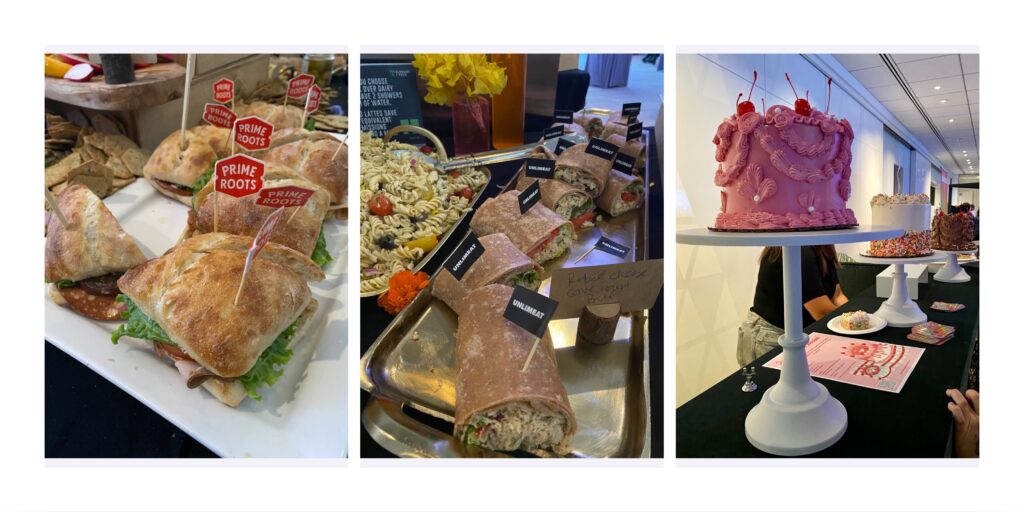
From a food point of view, it was totally aligned. All food and beverages were fully plant-based and sourced locally from some of my favourite eateries like Hey, Sunshine Kitchen, Cena Vegan, Monty’s Good Burger, and Just What I Kneaded. I was thrilled to see so many great plant-based brands showcased daily like Impossible Foods, Better Balance, and Rebel Cheese – I couldn’t get enough of the latter’s Brie! The “Vegan Food Experience” also included deli cuts and sandos by Prime Roots, tuna wraps by Unlimeat, Impossible Burgers, yummy vegan desserts, and snacks from ReGrocery.
The Summit organizers worked with Earth Angel to ensure there were compostables and compost bins throughout the venue as well as reusable cups at the Bevi water stations and bar.
Not only was the Hollywood Climate Summit climate-friendly, but it was also inclusive. They didn’t just talk the talk, they very much walked the walk. The summit had ASL interpreters for all content, provided gender-neutral restrooms, offered sliding scale ticket pricing, and streamed free virtual programming for anyone who couldn’t attend in person. The full summit is now available on their YouTube channel.
The message to Hollywood
As so many speakers touched on, collaboration and the power of diverse communities are key if Hollywood is to emerge a hero in the fight against climate change. Filmmakers must assume their responsibility to tell stories about the time in which they live and scary as it is, we’re living in a time of climate crisis. The entertainment industry has the power to influence and shape today’s global culture – in fact, some might say no other industry is better positioned to fight climate change.
It takes a village and I felt I was a part of one at the Hollywood Climate Summit. As best put by one of the Daniels, the Oscar-winning directors of Everything Everywhere All at Once, during last year’s summit: “There’s no calvary, we are the calvary.”
Fade to black.

